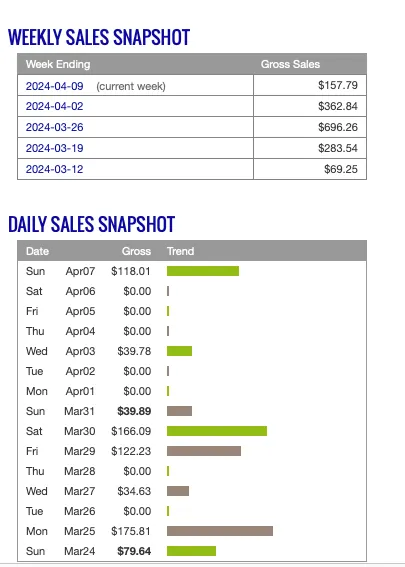Affiliate Marketing For Small Businesses
Affiliate Marketing Strategies: Boosting Small Business Success ...
<iframe class="custom-embed-iframe" id="blot-custom-id---ndzrLhB2n" srcdoc="
<script async src="https://www.googletagmanager.com/gtag/js?id=G-0D5LX0FG72"></script>
<script>
window.dataLayer = window.dataLayer || [];
function gtag(){dataLayer.push(arguments);}
gtag('js', new Date());
gtag('config', 'G-0D5LX0FG72');
</script>" allowfullscreen="true" frameborder="0" width="100%" style="height: 237px;">

Affiliate Marketing Strategies -Boosting Small Business Success in today's digital age, small businesses are constantly seeking innovative ways to expand their reach and increase revenue. One strategy that has gained significant traction in recent years is affiliate marketing. This article will delve into what affiliate marketing entails, why it's crucial for small businesses, and how they can effectively leverage it to boost their bottom line.
Introduction to Affiliate Marketing
Affiliate marketing is a performance-based marketing strategy where businesses reward affiliates for each customer or visitor brought about by the affiliate marketing efforts. Essentially, it's a symbiotic relationship between merchants and affiliates, where both parties benefit from increased sales and exposure.
What Is Affiliate Marketing For Small Business
Affiliate marketing involves three primary players: the merchant, the affiliate (also known as the publisher), and the consumer. The merchant provides the product or service, the affiliate promotes it, and the consumer makes a purchase through the affiliate's unique link.
Understanding Affiliate Marketing
Affiliate marketing stands as a powerful tool for small businesses aiming to expand their reach and increase revenue streams. In essence, it involves partnering with individuals or other businesses (affiliates) who promote your products or services in exchange for a commission on sales generated through their efforts.
The Importance Of Affiliate Marketing for Small Businesses
For small businesses with limited marketing budgets, affiliate marketing offers a cost-effective way to reach a wider audience. By partnering with affiliates who have established platforms and engaged audiences, small businesses can amplify their brand visibility and drive more traffic to their website.

Getting Started with Affiliate Marketing
Choosing a Niche
Before diving into affiliate marketing, small businesses must identify their target audience and select a niche that aligns with their products or services. By focusing on a specific market segment, businesses can tailor their marketing efforts to meet the needs and preferences of their target demographic.
Crafting Compelling Offers
To entice affiliates to promote your products, you need to offer attractive commission rates and incentives. Strike a balance between profitability for your business and appealing rewards for your affiliates. Additionally, provide them with high-quality promotional materials, such as banners, product images, and compelling copy, to facilitate their marketing efforts.
Finding the Right Affiliate Program
Once a niche is chosen, the next step is to find suitable affiliate programs that offer products or services relevant to the business's niche. It's essential to research and vet potential affiliate partners to ensure they are reputable and align with the business's values and goals.
Affiliate Marketing Strategy

Building an Affiliate Marketing Strategy
Understanding Your Audience
To effectively market products or services through affiliates, small businesses must have a deep understanding of their target audience's demographics, interests, and pain points. This knowledge enables businesses to create targeted marketing campaigns that resonate with their audience and drive conversions.
Identifying Your Target Audience
Before diving into affiliate marketing, it's crucial to pinpoint your target audience. Who are the potential customers most likely to benefit from your offerings? Conduct thorough market research to understand their needs, preferences, and online behavior. This insight will guide your affiliate recruitment efforts and help you tailor marketing materials for maximum impact.
Creating Compelling Content
Compelling content is the cornerstone of a successful affiliate marketing strategy. Whether it's blog posts, social media posts, or video reviews, businesses must produce high-quality content that educates, entertains, and persuades their audience to take action.
Leveraging SEO Techniques
Search engine optimization (SEO) plays a crucial role in driving organic traffic to a business's website and affiliate links. By optimizing their content for relevant keywords and improving their website's visibility in search engine results, small businesses can attract more visitors and potential customers.
Implementing Affiliate Marketing for Small Businesses
Setting Realistic Goals
Before launching an affiliate marketing campaign, small businesses should establish clear, measurable goals to track their progress and success. Whether it's increasing website traffic, generating leads, or driving sales, setting realistic goals ensures that efforts are focused and results-oriented.
Identifying Key Performance Indicators (KPIs)
Key performance indicators (KPIs) are metrics used to evaluate the effectiveness of an affiliate marketing campaign. Common KPIs include click-through rates, conversion rates, and return on investment (ROI). By monitoring these metrics, businesses can identify areas for improvement and optimize their marketing efforts accordingly.

Tracking and Analyzing Results
Tracking and analyzing campaign results is essential for optimizing performance and maximizing ROI. By using analytics tools and tracking software, small businesses can gain valuable insights into their audience's behavior, preferences, and purchasing patterns, allowing them to refine their marketing strategies for better results.
Implementing Effective Tracking and Analytics
Tracking the performance of your affiliate marketing campaigns is essential for optimizing results. Utilize tracking software or platforms to monitor clicks, conversions, and overall campaign effectiveness. Analyze the data gathered to identify top-performing affiliates, successful promotional strategies, and areas for improvement. This data-driven approach enables you to refine your tactics and maximize ROI.

Overcoming Challenges in Affiliate Marketing
Competition
The affiliate marketing landscape is highly competitive, with thousands of businesses vying for the attention of consumers. To stand out from the crowd, small businesses must differentiate themselves by offering unique products, compelling content, and exceptional customer service.
Building Trust with Your Audience
Trust is a crucial factor in affiliate marketing, as consumers are more likely to purchase products or services recommended by someone they trust. Small businesses can build trust with their audience by being transparent, honest, and genuine in their marketing efforts, and by delivering on their promises.
Nurturing Relationships
Building strong relationships with your affiliates is key to long-term success in affiliate marketing. Communicate regularly, provide support and guidance, and recognize their contributions to your business. By fostering a collaborative and mutually beneficial partnership, you can encourage ongoing engagement and loyalty from your affiliates.
Adapting to Changes in the Industry
The affiliate marketing industry is constantly evolving, with new technologies, trends, and regulations shaping the landscape. Small businesses must stay abreast of these changes and be willing to adapt their strategies accordingly to remain competitive and relevant in the market.
Staying Compliant and Ethical
In the ever-evolving landscape of digital marketing, it's crucial to adhere to ethical standards and legal regulations. Ensure that your affiliate marketing practices comply with relevant laws, such as the Federal Trade Commission (FTC) guidelines on disclosure and transparency. Transparency builds trust with your audience and protects your brand reputation in the long run.
Conclusion
In conclusion, affiliate marketing presents a unique opportunity for small businesses to expand their reach, increase sales, and build brand awareness cost-effectively. By understanding the fundamentals of affiliate marketing, creating compelling content, and leveraging SEO techniques, small businesses can effectively harness the power of affiliate marketing to achieve their business goals and drive success.
Affiliate marketing presents a valuable opportunity for small businesses to expand their online presence, drive sales, and foster mutually beneficial partnerships. By understanding your target audience, selecting the right affiliates, crafting compelling offers, and leveraging data-driven insights, you can unlock the full potential of affiliate marketing to propel your business growth. Embrace this dynamic marketing strategy and watch your small business thrive in the digital marketplace.
FAQs
- Q.What is affiliate marketing, and how does it work?
A. Affiliate marketing is a performance-based marketing strategy where businesses reward affiliates for each customer or visitor brought about by the affiliate's marketing efforts. Affiliates promote products or services through various channels, such as websites, blogs, and social media, and earn a commission for each sale or referral generated through their unique affiliate links.
2.Q.How can small businesses benefit from affiliate marketing?
A.Affiliate marketing offers several benefits for small businesses, including increased brand visibility, expanded reach, and cost-effective marketing. By partnering with affiliates who have established platforms and engaged audiences, small businesses can amplify their marketing efforts and drive more traffic and sales.
3 Q.What are some key considerations for small businesses when starting an affiliate marketing program?
A. When starting an affiliate marketing program, small businesses should carefully choose their niche, select reputable affiliate partners, and develop a comprehensive marketing strategy tailored to their target audience. It's essential to set realistic goals, track performance metrics, and adapt strategies based on feedback and insights.
4.Q.How can small businesses measure the success of their affiliate marketing campaigns?
A. Small businesses can measure the success of their affiliate marketing campaigns by tracking key performance indicators (KPIs) such as click-through rates, conversion rates, and return on investment (ROI). By monitoring these metrics and analyzing campaign results, businesses can identify areas for improvement and optimize their marketing efforts for better performance.
5. Q.What are some common challenges faced by small businesses in affiliate marketing, and how can they overcome them?
A. Some common challenges faced by small businesses in affiliate marketing include competition, building trust with their



